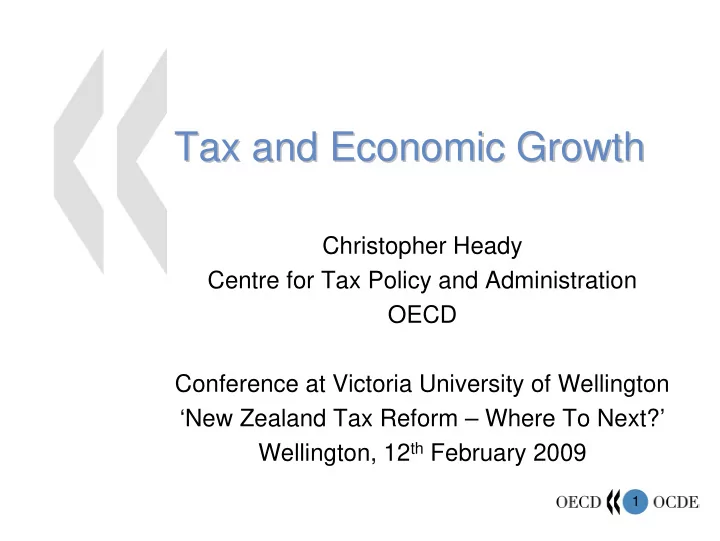

Tax and Economic Growth Tax and Economic Growth Christopher Heady Centre for Tax Policy and Administration OECD Conference at Victoria University of Wellington ‘New Zealand Tax Reform – Where To Next?’ Wellington, 12 th February 2009 1
Today’s presentation � Aims of the OECD’s tax and growth study � Empirical results on the tax mix � Empirical results on corporate taxes � Empirical results on personal taxes � Policy implications of the empirical results � Key policy issues from the literature � The trade-off between growth and equity 2 2
Aims of the OECD study � Does the tax structure, as opposed to the level of taxes, matter for GDP per capita and its rate of growth? � To what extent do different tax provisions affect investment and productivity (TFP)? � Does the industry/firm structure matter for the impact of taxes? 3 3
Empirical results: Broad tax structure � Macro findings suggest a “ranking” of taxes in terms of their negative impact on GDP per capita: property taxes (particularly recurrent taxes on residential property) < consumption taxes < personal income taxes < corporate income taxes. � Tax progressivity seems to reduce GDP per capita. 4 4
Corporate taxes: industry level � Corporate (statutory/effective) taxes affect investment negatively by increasing the user cost of capital. � Corporate (statutory/effective) taxes tend to impact productivity negatively and seem to matter more in highly profitable/risky industries. � R&D tax incentives seem to increase productivity and seem to matter more in R&D intensive industries. 5 5
Corporate taxes: firm level � Statutory corporate taxes seem to have a smaller negative impact on productivity growth in firms that are both young and small. � Statutory corporate taxes seem to have a stronger negative impact on productivity growth in ‘dynamic’ firms, that are profitable and experiencing rapid productivity growth. 6 6
Personal income taxes: industry level � High top marginal personal income tax rates reduce productivity growth, especially in industries with industries characterised by high entry rates of new firms � High social security contributions reduce productivity growth, especially in labour intensive industries. 7 7
Potential policy implications of the empirical results: Broad structure � Broad simplistic implication for the tax structure: Shift towards more use of consumption and property taxes (particularly residential) and less income taxes, needs to be put into perspective of each country’s tax system. Distributional concerns can be an obstacle. � Reducing income tax progressivity: Trade off between enhancing GDP per capita and increasing net wage inequality 8 8
Potential policy implications of the empirical results: Corporate taxes � Cutting corporate taxes could positively affect investment. It is possible that product market regulations and large administrative burdens on firms can make investment decisions less responsive to taxes. � Cutting corporate taxes may also promote productivity growth . � Need to be careful about lowering the corporate rate much below the top personal income tax rate. � Effect on equity is hard to assess. 9 9
Potential policy implications of the empirical results: Personal income taxes � Countries with a large share of industries with high turnover rates (or wishing to move in this direction) may gain from reforming their top marginal tax schedule. However, this could increase inequality. � Reforming labour/SSC taxes could be more important for productivity in countries with a labour intensive industry structure. 10 10
Key policy issues from the literature � Broadening the base of consumption taxes is better for growth than increasing the rate. � There is limited scope to improve growth by using multiple consumption tax rates, and their equity effects are best achieved by other means. � In-work tax credits can promote growth by increasing participation rates, but care is needed to contain costs and minimise adverse effects on hours worked. 11
The trade-off between growth and equity � Move from income to consumption taxes generally seen as regressive � Reducing top rates of personal income tax is regressive BUT: � Residential property tax need not be regressive � Corporate income tax may fall on workers 12
CONCLUSIONS � Growth can be increased, at least in the short-to-medium terms, by shifting away from income taxes � Recurrent taxes on immovable property are the least harmful to growth � It is necessary to design individual taxes well in order to benefit most from any tax shift � There is likely to be a trade-off between growth and equity, but there may be exceptions 13
� Full report: ‘Tax and Economic Growth’, Economics Department Working paper No. 620. � http://www.oecd.org/dataoecd/58/3/41000592.pdf 14
Recommend
More recommend